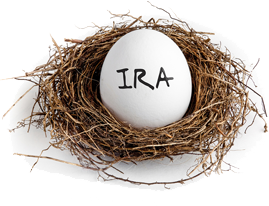With regard to charitable giving, not all assets are equal. For tax reasons, some assets may be better to pass on to heirs, while others may be better to give to your favorite causes. Consider the potential tax treatment of retirement benefit plans such as IRAs, 401(k)s, etc. A simple story illustrates why, for example, an IRA may make a better charitable gift, while other assets may be better for heirs, based on tax provisions.
Old Man Lear and his Four Beneficiaries
Consider the simple story of old man Lear and his four beloved daughters: Cordelia, Goneril, Regan, and Ashlee. (Feel free to take a break and go brush up on your King Lear!)Lear, no fool, engages in estate planning with the intention of helping each of his daughters in the future. He has four major assets: his house, stock, a painting, and his IRA. Each asset is worth roughly the same (plus/minus just a few dollars).

- Lear’s house is worth $100,003. He purchased it for only $20,000.
- Lear owns shares of stock in Acme Company, valued at $100,002. He bought the stock for just $50,000.
- Lear has a famous painting of a castle. It’s valued at $100,009; he purchased it for $35,000.
- Lear has dutifully paid into an IRA that’s now up to $100,020.
Nothing if not fair, Lear divvies up the four assets to each daughter. Do all four daughters get more or less the same deal?
Three Tax Concepts
Before answering, we need to consider three important tax concepts:
(1) Inheritance as income
(2) Income in respect of a decedent
(3) Step-up in basis (also called, stepped up basis)
The interplay of these concepts may make charitable gifts of retirement plan assets more attractive to your clients than charitable gifts of other kind of assets.
Inheritance as Income
Under our federal income tax rules, receipt of almost every type of asset counts as income. One of the rare exceptions in inheritance of property. Generally speaking, inheritance is not income, for federal tax purposes. Most inherited property passes tax-free. (It’s true there is an Iowa inheritance tax. To keep this article simple(r), I’ll focus on federal tax).
Income in Respect of a Decedent (IRD)
Of course, with every rule in federal tax law, there’s an exception. Most inherited property passes tax-free, but not all. IRD is income that the deceased was entitled to, but had not yet received, at time of death. IRD can come from various sources, including:
(1) Unpaid salary, fees, commissions, and/or bonuses;
(2) Deferred compensation benefits;
(3) Accrued but unpaid interest, dividends, and rent; and
(4) Distributions from retirement benefit plans
That’s right – retirement benefit plans are IRD.
Federal tax law provides for IRD to be taxed when it’s distributed to the deceased’s beneficiaries. IRD retains the character it would have had in the deceased’s hands.
Step-up in basis
Step-up in basis is a critically important concept. It refers to the readjustment of value of an appreciated asset for tax purposes upon inheritance. With a step-up in basis, the value of the asset is determined to be the market value of the asset at the time of inheritance, and not the value at which the original party purchased the asset.
Four Beneficiaries and Four Assets
Cordelia’s inherits the house. As we discussed, there’s no federal tax on inheritance. Cordelia sells the house for $100,003. Still, no federal tax. Although Lear purchased the house for only $20,000, recall that Cordelia receives a step up in basis. Cordelia’s basis is $100,003, the fair market value (FMV) of the house. Since she sells it for $100,003, there’s nothing to tax.

When Goneril inherits the stock, there’s no tax—as there’s no taxable event. Soon, Goneril sells the stock. Although Lear purchased the stock for just $50,000, Goneril receives a step up in basis. Goneril’s basis is $100,002, the stock’s FMV. Since she sells the stock for its new stepped-up basis, there’s nothing to tax.

Regan inherits the painting, with the same result. There’s no federal tax on inheritance of the painting. When Regan immediately sells the art for FMV, there’s nothing to tax, as the FMV, and step-up in basis, are the same.

How about Ashlee and the IRA? If Ashlee withdraws money from the IRA, it’s a different story. Ashlee will have to pay federal income tax of up to 39.6 percent. (It is true that Ashlee could defer withdrawals from the IRA for a long time, and of course such deferral reduces the impact of taxes.)

To sum up, in this hypothetical, the house, stock, and art passed to the beneficiaries without any taxable event, and the daughter were able to sell without tax consequences. The IRA passed to the fourth daughter, but she will have to pay taxes when she withdraws funds.
When considering charitable gifts, also consider the tax code. And, considering talking to your kids about these issues. After all, not all assets are equally beneficial to heirs. In this case, retirement benefits plans may make an ideal gift to your favorite cause.










